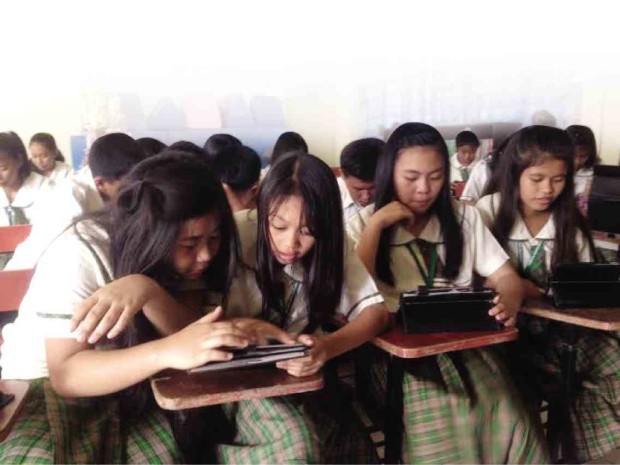
STUDENTS of Biñan National High School in Biñan City, Laguna province, browse through the contents of the e-Rizal tablets. MARICAR CINCO
Not many people knew Trinidad, one of the sisters of national hero Dr. Jose Rizal. On the hours leading to his execution, Rizal was said to have handed Trinidad a small alcohol burner, or lamparilla, that contained his final written work, “Mi Ultimo Adios” (My Last Farewell).
“It was to her that Rizal gave that poem,” said Tricia Reyes, a perky 13-year-old student of Biñan National High School in Biñan City, Laguna province. She remembered this after reading Rizal’s life story, divided into three parts, from the “e-Rizal” tablet.
Last year, Reyes said she and her friends sneaked into one of the classrooms where the tablets were being kept and started browsing their contents. “It was pretty interesting and fun answering the quizzes after each lesson,” she said.
The e-Rizal tablets are a project of the provincial government and the Department of Education (DepEd) as a learning aid for incoming Grade 7 students. It was launched in 2011, with a grand celebration in Laguna, Rizal’s home province, for the national hero’s 150th birth anniversary.
Eighteen public high schools in Laguna received 50 tablets each, according to the DepEd. The government spent P591,090 for the project, covering the costs of training of information and communications technology (ICT) experts and teachers, research, and the device.
Seldom used
But like a dusty history book, Rizal’s story, summed up in a computer application, ended up in a plastic storage box.
Joel Valenzuela, the school principal, said the tablets were only used a couple of times in the previous years. A few were already lost and some were locked with pass codes by students who used them in previous years.
The tablets’ operating system (OS) was also already outdated. When checked by the Inquirer last week, the tablets were still working though the OS could no longer be updated.
The government purchased the e-Rizal tablets from Ionics, a Filipino-owned design and manufacturing company based in Calamba City, also in Laguna. Each measures about 7 inches and is powered by Android 2.3 Gingerbread.
Aside from Rizal’s life story, electronic books and online courses on Science, Mathematics and English, as well as practical courses, such as dressmaking, were downloaded into the device.
“We used it once last year for my computer class,” said teacher Ferdinand Arbo.
Much as he wants his students to use the tablets in class, Arbo said there were not enough for everyone. This school year, Biñan National High School has over 3,000 students, with more than 300 enrolling in Grade 11.
Once, the teachers allowed the students to take the tablets home. “When these were returned, I had to delete from each [device] pictures and videos [taken by students at home],” Arbo said.
Other teachers, especially the older ones, would rather stick to the traditional teaching methods, he said.
A WOMAN walks past a mural of national hero Jose Rizal in Ermita district, Manila. MARIANNE BERMUDEZ
Pet project
Rogel Opulencia, the assistant division schools superintendent of Laguna, said the project started off on the right foot with several training sessions for teachers on the use of ICT during the pilot years.
“It was actually a pet project of [former Laguna] Governor ER (Jeorge Ejercito), hence its name,” Opulencia said, referring to initials “E.R.” When the official stepped down, the project stopped, he said.
Ejercito was elected governor in 2010 and 2013, but his second term was cut short after he was ousted for campaign overspending. Then Vice Gov. Ramil Hernandez took over and won as governor in last month’s gubernatorial election, beating Ejercito.
The new administration was lukewarm about the project, “so we had to take off the ‘ER’ (from e-Rizal),” Opulencia said.
‘Classroom in a Box’
With the e-Rizal virtually dead, the DepEd is launching a new program, called “Classroom in a Box,” which still uses computer tablets. It will deploy 16 units of Samsung Galaxy tablets, each in a box, to a remote sitio (sub-village) in Kalayaan town next month.
“There’s no electricity [in the village] and you have to take a boat to get there,” said Erik Zaide, the department’s Laguna education program supervisor who was also part of the e-Rizal project team.
The students could charge the tablets from a car battery powered up by an improvised bicycle, Zaide said
Like the e-Rizal, Opulencia said the Classroom in a Box still aimed to promote history and nationalism among students. But instead of funds coming from politicians, the DepEd is working this time with private donors to ensure the project’s sustainability, he said.